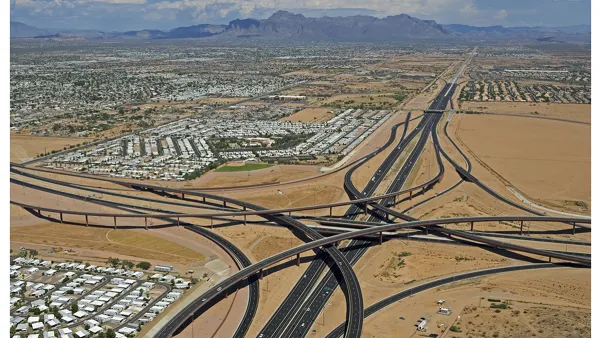Remember the legislation that, in 1965, affirmed universal suffrage in all elections? Yes, you do. It was called the National Voting Rights Act.
Remember the legislation that, in 1965, affirmed universal suffrage in all elections? Yes, you do. It was called the National Voting Rights Act.
Want to know what the new transportation authorization bill is called? Probably not.
The Voting Rights Act came from a more utilitarian age, which wisely sought no heroic rhetoric in the face of actual heroism. Under these more prosaic circumstances, the name Moving Ahead for Progress in the 21st Century probably came from a roomful of earnest and otherwise able Environment and Public Works Committee staffers who forgot that a clever name does little for a bill's posterity and even less for the esteem of the legislative process.
The resulting acronym, MAP-21, will look terrific on a PowerPoint slide. Flying past at 80 miles per hour Burma-Shave style, its full iteration would appear benign enough. And yet, though it falls mercifully short of the epic scale of its 2005 predecessor, SAFETEA-LU (don't ask), MAP-21 upholds the tradition of matching tortured rhetoric to the prosaic, if important, endeavor of pouring concrete and laying pavement.
We'll start with the easy part:
"21st Century": To what other century in the dismal saga of humankind could this legislation possibly refer? The federal government can hardly plan for last week much less for any other century but the one we're in. The days of romanticizing the 21st century are over. We can no longer expect pod cars, Mr. Fusion, global harmony, and sentient, homicidal mainframes. Given that the nation faces rusting girders, pockmarked pavement, crumbling concrete, and other silent horrors that threaten nearly everything with wheels, the upcoming authorization isn't even for the 21st century. At best it will clean up the mess left over from the 20th.
"Moving Ahead for Progress": "Moving ahead" relates obviously enough to transportation and has become one of those blithesome clichés that we can probably live with. Progress, however, has a thorny past. Two generations ago a white male elite brought "progress" to the level of fetish, equating it with newness, rationality, and the denial of history, diversity, and other messy, subjective things that make humanity both great and terrifying. This notion took the form of steel boxes, concrete plazas, and, not coincidentally, the freeway system. If we are to talk about progress today, it must entail steps backwards, towards atavisms like public transit, cycling, walking, and so many other ways of getting around and relating to each other that have been forgotten.
The most curious part of this phrase, though, is the conjunction "for." If the nation was moving ahead towards progress, we could accuse it of redundancy (progress being a process, not an end), but not of the most gross sort. "For," however, is both ambiguous and nonsensical. Does it mean (1) "in order to achieve," (2) "at the behest of," or (3) "because of"? If the progress has yet to occur, then 3 won't get the train out of the station because something that does not exist cannot be an impetus. Progress isn't an agent, so 2 doesn't work either. I assume, then, that 1 is closest to the intended meaning: progress is the goal of said aheadwards movement. But if "moving ahead" is a metaphor and "progress" is an outmoded abstraction, then we end up groping in a pretend direction groping for an undefined goal. That sort of maundering might be fine for Jack Kerouac or William Least Heat Moon, but I'm not sure it embodies the right approach to serving the transportation needs of 300 or so million folks who are just trying to get to work, school, or the first tee every morning.
No matter what it's called, crafting the next transportation reauthorization will be monumental challenge of beaming those needs down from Capitol Hill to Main Street. Even without concerns for earmarks, partisan politics, and financial catastrophe, writing this kind of bill would test the mettle of the most seasoned policy experts. Lucky for them and us, as the Bard reminds us, a name as saccharine as MAP-21 shouldn't matter any more than did the names Titanic, Edsel, Concorde, Spirit of St. Louis, Desire, or General Lee.
What matters is the substance of the bill: how many bridges it reinforces, how oil tankers it holds at bay, and how many lives it saves. Doing those things well-and I have more faith now than I have had in a long time-will give Americans something worth remembering.

Analysis: Cybertruck Fatality Rate Far Exceeds That of Ford Pinto
The Tesla Cybertruck was recalled seven times last year.

National Parks Layoffs Will Cause Communities to Lose Billions
Thousands of essential park workers were laid off this week, just before the busy spring break season.

Retro-silient?: America’s First “Eco-burb,” The Woodlands Turns 50
A master-planned community north of Houston offers lessons on green infrastructure and resilient design, but falls short of its founder’s lofty affordability and walkability goals.

Test News Post 1
This is a summary

Analysis: Cybertruck Fatality Rate Far Exceeds That of Ford Pinto
The Tesla Cybertruck was recalled seven times last year.

Test News Headline 46
Test for the image on the front page.
Urban Design for Planners 1: Software Tools
This six-course series explores essential urban design concepts using open source software and equips planners with the tools they need to participate fully in the urban design process.
Planning for Universal Design
Learn the tools for implementing Universal Design in planning regulations.
EMC Planning Group, Inc.
Planetizen
Planetizen
Mpact (formerly Rail~Volution)
Great Falls Development Authority, Inc.
HUDs Office of Policy Development and Research
NYU Wagner Graduate School of Public Service



























